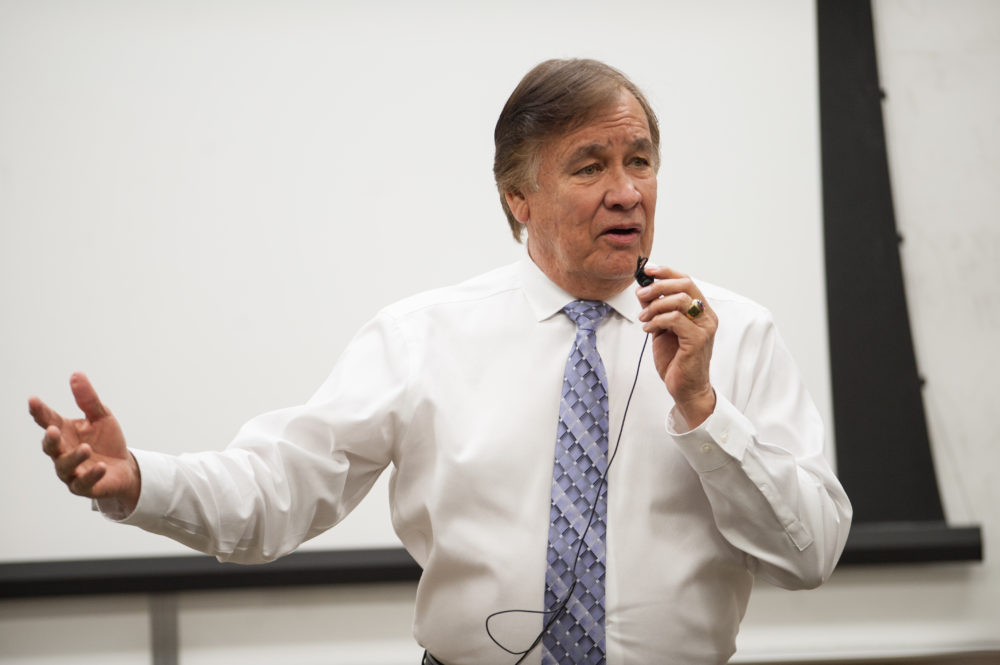
Billy Mills won the 10,000 meter run at the Tokyo Games in 1964.
As a sports fan, the most important moments in sports history come when at least one of two things happens: an underdog wins, or something happens that is bigger than sports itself.
These are the stories that send chills up your spine, and make you realize just what sports are. There are a couple moments in particular that spring to mind when I think about this.
The first is one more common here in the United States: Mike Eruzione’s game winner against the Soviet Union in Lake Placid, followed by the Al Michael’s call at the end of the game, “Do you believe in miracles?!”
The second is a little less known here, but it’s Siphiwe Tshabalala’s goal for South Africa in the opener of the 2010 World Cup. It was an English commentator with my favorite call, “Goal for South Africa, a goal for all of Africa!” I knew that goal meant so much to that country and the continent; I could not help but feel chills.
Then, Friday night at Sudro Hall, I learned of another moment that gives me the chills. Olympic gold medalist Billy Mills was there giving a talk about his journey, and it fits both of the criteria. Mills won the 10,000 meter run at the Tokyo Games in 1964. What he had to endure, though, makes the story.
Mills was born in South Dakota, on the Pine Ridge Indian Reservation. A member of the Lakota Tribe, he lived in one of the most impoverished places in the U.S. His situation was not helped as both of his parents died before he was 12. Mills said that his ancestry made his life difficult. He had one Native American parent, and one white. The footsteps that they had made through history almost conflicted each other.
“My wings were broken, but my dad said, ‘The only way wings are healed are through dreams,’” Mills said.
He found his dream in running.
Mills went on to the University of Kansas, were he would be named an All-American three times. He still ran into issues though. He faced discrimination constantly, most notably because of his All-American status. Even though he was the only American on the five man team, he was asked to step out of the picture because of race. He said each of the three times, he broke a little more.
After college, Mills joined the Marine Corp, and found himself in the Tokyo Games. Having not won a major race, he found himself in the final. In front of 85,000 people, Mills went out and kept contact with the lead group, which held pre-race favorite and world-record holder Ron Clarke from Australia.
The group went out quick, and Mills said that “I was three seconds off my fastest three-mile in my life, but it is a 6.2 mile race.”
After dealing with so much in his life, Mills had a chance to capture his dream. With two laps to go, Mills, Clark and Tunisia’s Mohammed Gammoudi were left to battle it out. With 300 meters remaining, Gammoudi muscled his way into the lead, and started gapping the pair. Clarke responded, and started closing the gap. Mills looked out of it with 200 meters to go.
“I am a type-2 diabetic,” Mills said. “I was just worried about finishing the race.”
With just over 100 meters to go, the final kicks to the finish began. There was a large group of lapped runners that the leaders had to work through. Mills started closing. He worked his way through the traffic when he noticed something. He caught the slightest glimpse of the crest on the front of a German’s jersey.
“It was an eagle, and my dad (told me) when I was small: ‘Son, you do these things, someday you’ll have wings of an eagle.’”
He knew this was his chance, so he left everything on the track.
He ran right into the lead, and broke the tape. He was the new Olympic champion.
After years of being torn down, discriminated against and broken, Mills had finally achieved his goal. This was not just an accomplishment for him, but for his family, his tribe and his nation.
